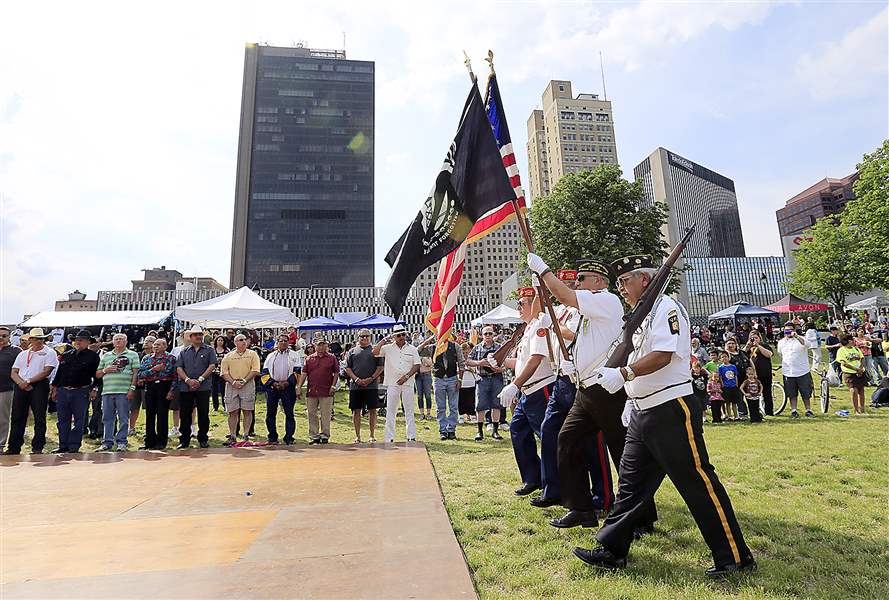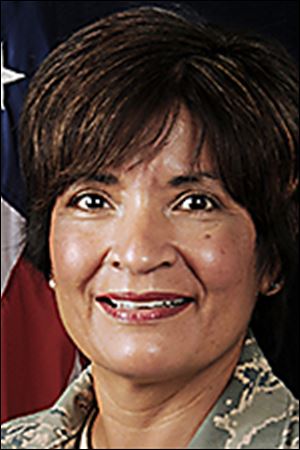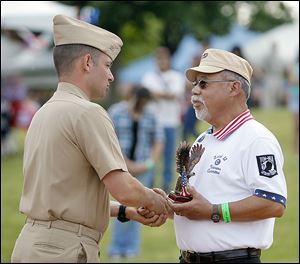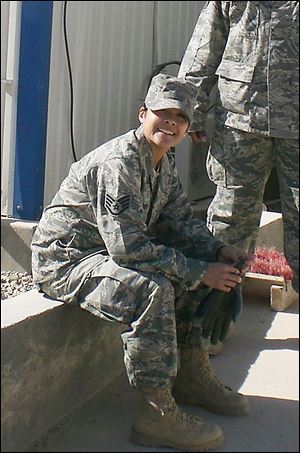
GENDER, RACE ISSUES
Latinas in military overcome obstacles
Toledo veterans’ event honors 30 males
6/8/2013
Lou Diamond Marine Corp League 272, Toledo, presents the colors at the Midwest LatinoFest at Promenade Park.
THE BLADE/ANDY MORRISON
Buy This Image

Lou Diamond Marine Corp League 272, Toledo, presents the colors at the Midwest LatinoFest at Promenade Park.
The Godfather of Soul, James Brown, may have sung, “It’s a Man’s Man’s Man’s World.”

Annie Menchaca-Bratton was an early female Latina military enlistee.
But it was Tina Menchaca of Toledo who told her 19-year-old daughter, Annie, “A woman is just as strong, and can do anything she wants to do.”
At a time when women joining the military was still a rarity, Annie Menchaca took her mother’s advice to heart and joined the Ohio Air National Guard’s 180th Fighter Wing in 1978 — the first Latina to enlist there.
During her 35-year career she’s served in Panama, Kuwait, Japan, and Turkey, just to name a few places.
PHOTO GALLERY: Click here to view.
“Latinas in the military?” says the now 54-year-old Senior Master Sgt. Annie Menchaca-Bratton, who plans to retire in December. “There were hardly any women, period.
“It’s still very much a man’s world, but the opportunity for women now is remarkable. The military is still trying to learn to accommodate us. We’re still the minority.”
That’s changing. From 1973 to 2010, the number of active-duty enlisted women in the military has grown from about 42,000 to 167,000, according to a study by the Pew Research Center, a nonpartisan fact tank that informs the public about issues and trends shaping America and the world.
Pew’s studies also show the number of Latinas joining the military has grown rapidly in recent years; Hispanic women now outpace Hispanic males in enlistments.
It’s currently estimated that about 21,000 Latinas serve in all branches of the military, according to data from Pew and the U.S. Department of Defense.
Despite their growing numbers, women in the military don’t usually receive the recognition they deserve and that needs to change, Toledo City Councilman Adam Martinez said.
During the past week, Toledo has honored Vietnam-era veterans and all Latino veterans, culminating with a ceremony at the LatinoFest on Saturday in Promenade Park. Most activities at those events emphasized male veterans.
About 30 veterans and active duty military members were at the LatinoFest ceremony. Each was honored with a commemorative coin; all were men.
Many Latina veterans in the Toledo area said they were not aware of the Saturday event. That’s not surprising to Mr. Martinez or many of the women.
Serving in the military is a tradition among men in many families, especially in Mexican-American families, Mr. Martinez said.
For example, he served in the Air Force, his father, John, served in Vietnam, his brother Patrick served in the Marines, and his brother Danny recently retired from the Navy.

Haraz Ghanbari, left, military and media liaison at the University of Toledo, presents Hector Flores, Sr., of Toledo with an award during the Midwest LatinoFest in Promenade Park on Saturday.
But it’s not just a male tradition anymore, Mr. Martinez pointed out, saying his cousin Sylvia Geronimo-Costello is an aerospace medical technician in the Air Force. Many other women fill crucial roles in the military, he said.
“I think it’s a great thing to see Latinas serving in the military,” Mr. Martinez said. “Wanting to serve your country is not gender-biased. Patriotism isn’t gender-biased, especially in our gender-biased culture.”
George Plasencio, 52, of Toledo who is in the Air National Guard was one of the men honored at Saturday's ceremony. He has a son, Esteban, in the Air Guard and a daughter, Lindsay, who is a senior at the Air Force Academy.
Miss Plasencio joined the Air National Guard in 2007. While Mr. Plasencio was immediately proud of his daughter's decision, his wife was unsure if it was the right choice.
“I was a recruiter at the time, and I wasn’t allowed to talk to my daughter about it,” Mr. Plasencio said. “My daughter had come to me and said she wanted to join. And what do you do? Show her the positives and convince my wife that it was going to be a good thing. Now my wife’s very glad she did join.”
Doors opened
Many Latinas from Toledo who serve in or are retired from the military say their experience has provided them with many opportunities: Chances to see the world, serve their country, learn new skills, and obtain an education.
Along the way, there were many challenges and obstacles, some more frightening and dangerous than others.
“Personally, I’ve experienced sexual assault in the military,” said Tamara Gonzales, 45, a highly decorated master sergeant who has served in the Ohio Air National Guard for 20 years. “That’s just how it is. You have to take precautions. You always have to remember that you’re outnumbered 20-1.”
The daughter of farm workers, she was raised on Toledo’s south side.
She said she used lessons from her parents: hard work, focus, and a “never-give-up” attitude to get through challenges in her personal life and military career.
In February, 2011, she became the first Latina to be named first sergeant at the 121st Air Refueling Wing in Mansfield, Ohio. She has bachelor's degrees in communications and Spanish and an associate’s degree in logistics, and has used her experiences — good and bad — to help other women adjust to military life.
“I’m an advocate,” she said. “I recruit all the time. I tell young Latinas about the opportunities, the education, and travel, and the many life transitions they’ll experience.”
Sylvia Geronimo-Costello, 38, who grew up in Toledo, joined the Air Force 13½ years ago. She wanted to follow her father and brother who had served in the Army.
Her father wasn’t too keen on the idea at first, she admits.
“I wanted to serve my country. I knew I would have an opportunity to get an education and to see the world,” she said. “My dad did not want me to go. He was of the old school of thought that women did not belong in the military.”
It took time, but eventually her father came to appreciate his daughter’s decision and now can often be found boasting to friends and strangers that his daughter is in the military.
When she first enlisted, there was still a lot of unspoken segregation, she said. Men looked down on women in general, and women of different ethnic groups tended to self-segregate, she said.

In 2010, Sylvia Geronimo-Costello, an Air Force aerospace medical technician, was at Camp Bastion in Afghanistan.
‘Starting to change’
“It’s starting to change,” Sergeant Geronimo-Costello said. “I’m seeing a lot more camaraderie between Latin and whites. Even when we're in uniform, we’ve had dances and opportunities to expose each other to different cultures. It helps people feel more comfortable around each other.”
Sylvia’s cousin, Cindy Geronimo, served in the 180th from 1986 to 1995.
Cindy Geromino enlisted because she wanted to “follow in the footsteps of a family friend who inspired her”: Sergeant Menchaca-Bratton.
“It was a calling for me, something I wanted to be a part of,” Mrs. Geronimo said. “I think our culture, as Mexican-Americans, we have a strong tradition of service and pride.
“You feel a sense of obligation and honor for serving your country,” she said. “I felt proud as a Latina to serve my country.”
Mrs. Geronimo, now executive director of the Lucas County Land Bank, said it was often a struggle to get male peers to take them seriously.
She was among four women deployed to Operation Just Cause in Panama in December, 1989. But the women had a hard time moving, let alone doing their jobs, she said.
“The men were all trying to protect us,” Mrs. Geronimo said. “They were just standing around us wanting to be very protective. We were just as well-trained as them.”
Experience counts
Like Sergeant Gonzales, Sergeant Menchaca-Bratton spends a lot of time recruiting, especially Latinas.
“I’m not going to lie,” she says, acknowledging that women were often harassed by males. “I’ve faced some adversity. Back in the day, just being a woman, you were noticed. I never let it stifle me. I asked myself: Are they doing it because I’m a woman, because I’m a Latina, or because they’re ignorant? I decided it was because they were just plain ignorant.”
The first thing she tells recruits is that “you need to respect yourself” — be careful what signals you send to males, because it could increase the risk of sexual assault.
Maj. Gary Bentley, the 180th’s executive officer, said Sergeant Menchaca-Bratton has been a role model not just for Latinas, but for everyone. She still gets perfect scores on her fitness tests, he said, and helps younger airmen manage their money.
“She’ll be missed after 35 years of service,” Major Bentley said. “But her legacy will be felt forever through all the others she’s influenced through the years.”
She’ll have help. Her son, Michael Bratton, recently enlisted as an airman first class, and her daughter, Alicia Bratton, an incoming junior at Eastwood High School, recently told her parents she plans to join the Air Force after graduation.
A niece, Chelsea Menchaca, is a senior airman.
Sergeant Menchaca-Bratton is quite pleased.
“If I had to live this life again, hands down I’d do it again,” she said. “But I’m ready to retire. Everything has to come to an end. But I know I’ll always be military. But that’s not all I am.”
Blade staff writer Sam Gans contributed to this report.
Contact Federico Martinez at: fmartinez@theblade.com or 419-724-6154.